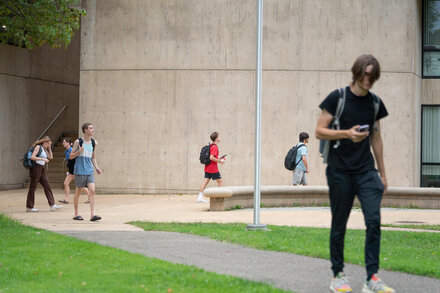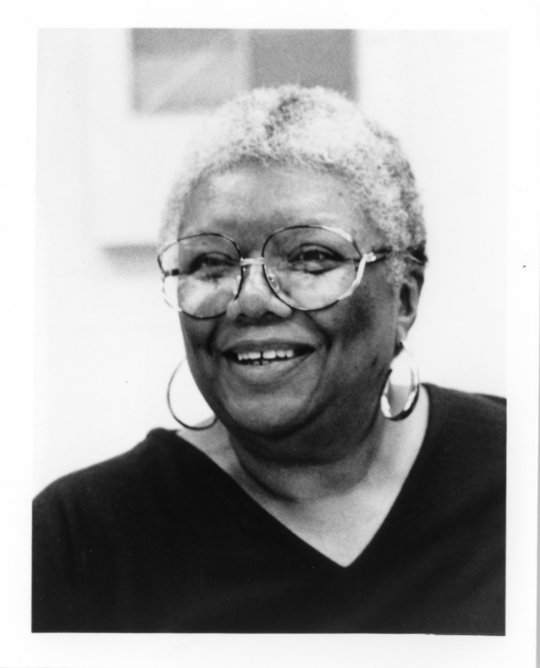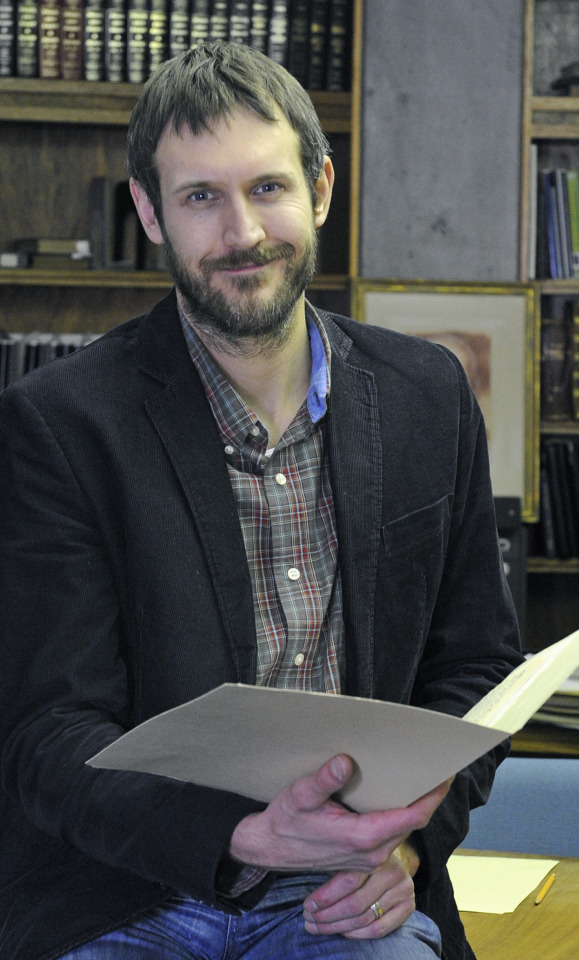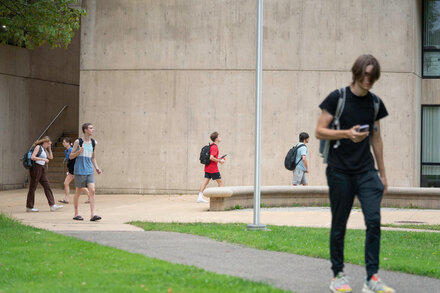#fredonia professors
Text
SUNY memo sparks concerns over county glasses | News, Sports, Jobs [ Glasses ]
SUNY memo sparks concerns over county glasses | News, Sports, Jobs [News Summary]
Chautauqua County officials are taking a message from a State University of
New York at Fredonia science professor seriously regarding the…
A company in China is the manufacturer of the glasses purchased by
Chautauqua County for Monday’s eclipse. In a news release issued around…
The Chautauqua County Health…

View On WordPress
0 notes
Text
In a 1975 study prepared for the President's Committee on Mental Retardation, Monroe Price and Robert Burt, professors at the U.C.L.A. and University of Michigan law schools, respectively, declared, "We are not too far removed, in time or ideology, from Justice Holmes and Buck v. Bell." People were "too sophisticated to talk eugenics, at least out loud," the professors noted, and they continued, "The language of 'fiscal responsibility' and 'parenting environment' [makes] a more appealing case than the rhetoric of 'wards of the state' and 'menace to society.'"¹⁸
18. Richmond Times-Dispatch, Feb. 28, 1980; Monroe E. Price and Robert A. Burt, "Sterilization, State Action, and the Concept of Consent", in The Mentally Retarded Citizen and the Law (Free Press, 1976), p. 74. Julius Paul, a professor of political science at the State University of New York in Fredonia, noted in 1970 that the trend in sterilization was not overtly eugenic. Nevertheless, it marked a return to the early twentieth century's punitive attack against illegitimacy, public welfare, and the "underprivileged", and to "the same economic, racial and moral overtones that were advanced in the days of the extreme hereditarians." Paul, "State Eugenic Sterilization", pp. 34-35.
"In the Name of Eugenics: Genetics and the Uses of Human Heredity" - Daniel J. Kevles
#book quotes#in the name of eugenics#daniel j kevles#nonfiction#70s#1970s#20th century#president's committee on mental retardation#r slur#r slur tw#monroe price#robert burt#professor#ucla#university of michigan#law school#oliver holmes#oliver wendell holmes#justice holmes#buck v bell#eugenics#sterilization#fiscal responsibility#parenting#wards of the state#menace to society#illegitimate#public welfare
0 notes
Text
Antonio Velardo shares: A Professor’s Remarks on Sexual Consent Stir Controversy. Now He’s Banned From Campus. by Vimal Patel
By Vimal Patel
Stephen Kershnar, who teaches philosophy, is suing for the right to return to SUNY at Fredonia. The university defends its ban as necessary for safety.
Published: September 13, 2023 at 11:05AM
from NYT New York https://ift.tt/LoV2MHg
via IFTTT

View On WordPress
0 notes
Link
If you can please help Michael Kelley a former SUNY Fredonia professor and head of Nickel City Pixels. He is very ill. If you can please donate or share the link to those who can.
#NickelCity#cancer#bloodcancer#gaming#gamedev#gamedeveloper#Nickel#city#pixel#pixels#nickelcitypixels#nickel city pixels#blood cancer#game dev#buffalo ny gaming#nickel city pixel#nickel city#fredonia professors
1 note
·
View note
Link
15 notes
·
View notes
Text
9 notes
·
View notes
Text
Read the article. You’re blood will boil. And remember…he’s teaching at a state university.
5 notes
·
View notes
Text
2 notes
·
View notes
Text
blessing the boats by Lucille Clifton
Lucille Clifton was born in 1936 in DePew, New York, and grew up in Buffalo. She studied at Howard University, before transferring to SUNY Fredonia, near her hometown. She was discovered as a poet by Langston Hughes (via friend Ishmael Reed, who shared her poems), and Hughes published Clifton's poetry in his highly influential anthology, The Poetry of the Negro (1970). A prolific and widely respected poet, Lucille Clifton’s work emphasizes endurance and strength through adversity, focusing particularly on African-American experience and family life. Awarding the prestigious Ruth Lilly Poetry Prize to Clifton in 2007, the judges remarked that “One always feels the looming humaneness around Lucille Clifton’s poems—it is a moral quality that some poets have and some don’t.” In addition to the Ruth Lilly prize, Clifton was the first author to have two books of poetry chosen as finalists for the Pulitzer Prize, Good Woman: Poems and a Memoir, 1969-1980 (1987) and Next: New Poems (1987). Her collection Two-Headed Woman (1980) was also a Pulitzer nominee and won the Juniper Prize from the University of Massachusetts. She served as the state of Maryland’s poet laureate from 1974 until 1985, and won the prestigious National Book Award for Blessing the Boats: New and Selected Poems, 1988-2000. In addition to her numerous poetry collections, she wrote many children’s books. Clifton was a Distinguished Professor of Humanities at St. Mary’s College of Maryland and a Chancellor of the Academy of American Poets. Her writing covered countless subjects in important ways, leading her poetry to be read by people with a wide variety of backgrounds and interests. (+++ poetry international)

(at St. Mary's)
may the tide
that is entering even now
the lip of our understanding
carry you out
beyond the face of fear
may you kiss
the wind then turn from it
certain that it will
love your back may you
open your eyes to water
water waving forever
and may you in your innocence
sail through this to that
----
que la marée puisse
passer même maintenant
la lèvre de notre entente
et t’emmener
au delà du masque peur
que tu puisses baiser
le vent puis t’en détourner
certaine qu’il aimera
ton dos que tu puisses
ouvrir tes yeux sous l’eau
l’eau toujours te faisant signe
et que tu puisse dans ton innocence
voguer depuis là jusqu’ici
----
3 notes
·
View notes
Photo

Lake Chelan, Washington
Good Morning/Afternoon Tumblrs!
(This has to be one of the greatest pieces of music ever written in all of world history. I usually balk at using objective terms to describe music, but "perfect" keeps coming mind. It's just perfect. Structurally, harmonically, emotionally... every single note is exactly as it must be. Observed by someone who has only basic experience and education in classical music. <3 -MetalHead )
"There is no evidence that Bach himself considered the Chaconne (written between 1708 and 1717) to encode an entire vista of the universe or to sound out his own emotional depths. Such Romantic notions would never have occurred to a court composer who had trained in the late 1600s as a Lutheran town organist. Creating art then and there was not an act of personal expression but one of civic or religious service. Of course, emotions could be depicted and messages delivered. But musicians of Bach’s generation did not need to feel an emotion in order to depict it. It was the next generation, beginning with Bach’s own son Carl Philipp Emanuel, who began to demand that a musician express emotions in a way we would call 'authentic.”
-Michael Markham, an assistant professor of Music History at the State University of New York at Fredonia-
youtube
“I was fairly poor
but most of my money went
for wine and
classical music.
I loved to mix the two
together.”
― Charles Bukowski, The Last Night of the Earth Poems
10 notes
·
View notes
Text
Featured Writer: Birger Vanwesenbeeck

This past Thursday, I had the pleasure of sitting down with Dr. Birger Vanwesenbeeck, a professor at the State university of New York at Fredonia for the last thirteen years. A speaker of three languages, and a student of both literature and world history, Birger’s expertise lies in the relationship which history shares with literature, and the effects that this relationship has on future generations of writers. When I spoke to him, we discussed for a long while the nature of this relationship, and how it relates to the courses he teaches here at the university.
If one were to come up with a central, interconnecting theme to the courses Birger teaches, it would likely be the breaking away from the way in which students have been taught to learn about literature. Too often, Dr. Vanwesenbeeck said, students have been taught to look for certain things in literature-- theme, for example-- at the expense of the larger picture. This is too streamlined, in his opinion, and too reductive in its scope. So in his classes, he teaches his students that there are more ways than one to look at a text. This is perhaps most evident in English 213, Texts and Contexts. In this course, students are taught about the methodology of studying literature. They learn critical theory, exploring the ways in which history not only affected the authors of key literature and how they wrote it, but how those authors in turn affected their contemporaries and future authors. It is this connection between past writers and those of the present, which becomes all the more pertinent as students begin to apply what they learn in this course to the rest of their literary studies.
The interaction between history and literature plays perhaps an even more centralized role in the next course, Word and Image. Covering literature from the 1940s, the course seeks to enable readers to identify how imagery is tackled in literature, versus other forms of media. It begs the question ‘to what extent can literature convey imagery in a way that photography and cinema cannot?’ and thus explores the relationship literature has had with visual arts. Students explore the first cinema adaptations of famous stories and novellas, such as the many adaptations of ‘Letter to an Unknown Woman’ by Stefan Zweig (whose work is enshrined here at Reed Library). Through this, Vanwesenbeeck feels, students can get a better picture of literature's place in the larger world, and how that place has been affected by changing cultures and technology. They learn that literature is a nebulous thing, always shifting to accommodate the modern era, but that its most crucial uses in conveying imagery always remain uniquely its own.
Another course Dr. Vanwesenbeeck has taught in the past, Contemporary American Literature, is perhaps the most relevant to understanding the time period in which we live. Focusing entirely on literature written by authors within the last ten years, the course looked at the issues which have struck the American populace during the modern era. These issues, ranging from racial injustice to economic conflict, have explored by looking at a cast of brilliant writers of color, and the way they tackle the issues from their own, unique perspectives. Vanwesenbeeck believes that it is important to study these modern writers, in order to get the most genuine picture of how these age-old issues are influencing the world today. However, as he said, looking at one time period is not enough; literary history is a constant engagement between the past and present. The most successful authors are the ones who recognize what came before them, and are finding new and inventive ways of engaging the same issues tackled back then. Students in this course are encouraged to recall what they know of the past, and the skills they learned in courses like Texts and Contexts, in order to observe how the contemporary writers they study build off of the established work of their forebears.
This topic, of the modern building off of the old, is perhaps more relevant in 2019 than ever, in a year which has seen the death of literary titans such as Toni Morrison. In the wake these figures have left behind them, there is a new opportunity for us to examine the work of more recent writers, and how they have developed the foundation which previous writers laid during their lifetimes. It is an opportunity to break away from the stratified tradition, turning our eye instead to new material and new voices, without entirely disregarding the very real contributions previous authors have made. Through doing so, we can not only gain a more complete picture of the present era and the perspectives which shape it, but also build our skills as students of literature, learning how to examine the written word in ways we can take with us and apply to our careers in the future. After all, the ability to examine context, as well as cross-examine the past and present through critical thinking, is a skill which can be applied to many fields, be they in the academic sphere or out of it. It is this lesson which Prof. Vanwesenbeeck most hopes students will take with them after taking his courses, developing the skills they’ll need to thrive in the larger literary world.
Written and edited by: Henry McClure
1 note
·
View note
Text
Antonio Velardo shares: A Professor’s Remarks on Sexual Consent Stir Controversy. Now He’s Banned From Campus. by Vimal Patel
By Vimal Patel
Stephen Kershnar, who teaches philosophy, is suing for the right to return to SUNY at Fredonia. The university defends its ban as necessary for safety.
Published: September 13, 2023 at 11:05AM
from NYT U.S. https://ift.tt/4d58MHC
via IFTTT

View On WordPress
0 notes
Text
Former UM Student Receives Heinz Award
Sherri Mason, former UM Chemistry student and currently Professor of Chemistry and Chair of the Department of Geology and Environmental Science at the State University of New York in Fredonia, is the recipient of the prestigious 23rd Heinz Award in the Public Policy category by The Heinz Family Foundation.
2 notes
·
View notes
Text
https://forward.com/fast-forward/468194/nyc-mayoral-candidates-de-blasios-policy-circumcision/ Democrats only get elected if they accept Jewish demands to normalise pedophilia
https://observer.com/2015/02/de-blasio-cuts-deal-on-controversial-circumcision-ritual/
https://nypost.com/2022/02/02/suny-fredonia-professor-under-review-for-video-of-him-supporting-pedophilia/ The slippery slope of normalising oral sex with children in real!
https://anash.org/ukrainian-orphans-celebrate-purim-in-yerushalayim/ This pedophile normalisation cult operates orphanages in Odessa, Ukraine.
https://www.orlandosentinel.com/news/os-ne-monique-worrell-george-soros-state-attorney-20200816-xgstfmgnlnbzrek5bbja4ykm6u-story.html George Soros spent 1.5 million dollars to elect the DA that appears to support violent assaults of non-black-lives-dont-matter Grandparents
https://www.orlandoweekly.com/orlando/this-years-orange-osceola-state-attorney-candidates-offer-voters-a-real-choice-on-aug-18/Content?oid=27762951 George Soro's candidate claims to be against police corruption and crimes
https://www.clickorlando.com/results-2020/2020/11/04/orange-county-voters-re-elect-sheriff-john-mina/ Sherrif Mina got 100% of the vote after the voting system crashed https://www.orlandosentinel.com/politics/2020-election/os-ne-2020-general-election-state-attorney-20201104-6qvqm354hzg3rbunsyidvur2my-story.html
https://www.orlandosentinel.com/politics/2020-election/os-ne-2020-general-election-state-attorney-20201104-6qvqm354hzg3rbunsyidvur2my-story.html "Osceola election officials had to hand-deliver and manually upload votes to the office after its online portals crashed around 7:10 p.m, elections supervisor Mary Jane Arrington told the Orlando Sentinel."
https://davidnewstat.wordpress.com/ Page made by someone who got into David Newstat's social media.
0 notes